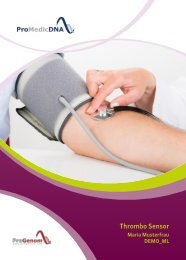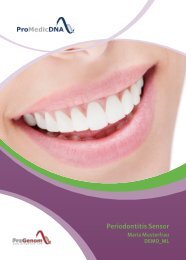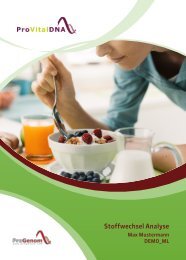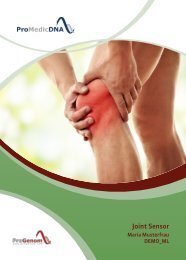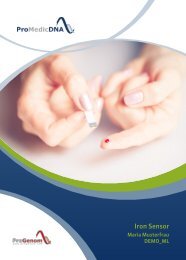ProVitalDNA - genetische Analysen - DEMO DE
Diese Demo-Analyse ist ein Paket und enthält folgende ProVitalDNA (genetische) Analysen: > Weight Sensor > Nutrition Sensor > Epigenetic Informationen > Toxo Sensor > Biological Age Sensor > Burnout Sensor Richitige Ernährung auf die individuelle genetische Veranlagung angepasst um sich gesund zu ernähren und die eigene Gewichtskontrolle ob abnehmen oder Gewicht halten im Griff zu haben. www.progenom.com
Diese Demo-Analyse ist ein Paket und enthält folgende ProVitalDNA (genetische) Analysen:
> Weight Sensor
> Nutrition Sensor
> Epigenetic Informationen
> Toxo Sensor
> Biological Age Sensor
> Burnout Sensor
Richitige Ernährung auf die individuelle genetische Veranlagung angepasst um sich gesund zu ernähren und die eigene Gewichtskontrolle ob abnehmen oder Gewicht halten im Griff zu haben. www.progenom.com
Sie wollen auch ein ePaper? Erhöhen Sie die Reichweite Ihrer Titel.
YUMPU macht aus Druck-PDFs automatisch weboptimierte ePaper, die Google liebt.
GPX1 - Glutathione Peroxidase (rs1050450)<br />
Das GPX Gen kodiert das Enzym Glutathionperoxidase, das die Reduktion von Peroxiden und Wasserstoffperoxid katalysiert. GPX<br />
spielt somit eine Rolle beim Schutz des Körpers vor oxidativem Stress.<br />
ERG Genotyp POP Ergebnismöglichkeiten<br />
X C/C 62% Guter Schutz gegen oxidativen Stress /Freie Radikale<br />
Literatur<br />
C/T 33% Eingeschränkter Schutz gegen oxidativen Stress /Freie Radikale<br />
T/T 5% Eingeschränkter Schutz gegen oxidativen Stress /Freie Radikale<br />
Tang et al. Association between the rs1050450 glutathione peroxidase-1 (C > T) gene variant and peripheral neuropathy in two independent samples<br />
of subjects with diabetes mellitus. Nutr Metab Cardiovasc Dis. 2012 May,22(5):417-25.<br />
Bhatti et al. Lead exposure, polymorphisms in genes related to oxidative stress and risk of adult brain tumors. Cancer Epidemiol Biomarkers Prev. Jun<br />
2009, 18(6): 1841–1848.<br />
Xiong et al. Association study between polymorphisms in selenoprotein genes and susceptibility to Kashin-Beck disease. Osteoarthritis Cartilage.<br />
2010 Jun,18(6):817-24.<br />
Soerensen et al. The Mn-superoxide dismutase single nucleotide polymorphism rs4880 and the glutathione peroxidase 1 single nucleotide<br />
polymorphism rs1050450 are associated with aging and longevity in the oldest old. Mech Ageing Dev. 2009 May,130(5):308-14.<br />
Steinbrecher et al. Effects of selenium status and polymorphisms in selenoprotein genes on prostate cancer risk in a prospective study of European<br />
men. Cancer Epidemiol Biomarkers Prev. 2010 Nov,19(11):2958-68.<br />
Chen et al. GPx-1 polymorphism (rs1050450) contributes to tumor susceptibility: evidence from meta-analysis. J Cancer Res Clin Oncol. 2011<br />
Oct,137(10):1553-61.<br />
Karunasinghe et al. Serum selenium and single-nucleotide polymorphisms in genes for selenoproteins: relationship to markers of oxidative stress in<br />
men from Auckland, New Zealand. Genes Nutr. 2012 Apr,7(2):179-90.<br />
Hong et al. GPX1 gene Pro200Leu polymorphism, erythrocyte GPX activity, and cancer risk. Mol Biol Rep. 2013 Feb,40(2):1801-12.<br />
Jablonska E et al. Association between GPx1 Pro198Leu polymorphism, GPx1 activity and plasma selenium concentration in humans. Eur J Nutr. 2009<br />
Sep,48(6):383-6.<br />
Cominetti C et al. Associations between glutathione peroxidase-1 Pro198Leu polymorphism, selenium status, and DNA damage levels in obese<br />
women after consumption of Brazil nuts. Nutrition. 2011 Sep,27(9):891-6.<br />
Miller JC et al. Influence of the glutathione peroxidase 1 Pro200Leu polymorphism on the response of glutathione peroxidase activity to selenium<br />
supplementation: a randomized controlled trial. Am J Clin Nutr. 2012 Oct,96(4):923-31.<br />
Combs GF Jr et al. Differential responses to selenomethionine supplementation by sex and genotype in healthy adults. Br J Nutr. 2012<br />
May,107(10):1514-25.<br />
NQO1 - NAD(P)H dehydrogenase, quinone 1 (rs1800566)<br />
Das Enzym NAD(P)H dehydrogenase, kodiert durch NQO1, ist eine sogenannte Oxidoreduktase und katalysiert die Oxidation von<br />
Nicotinamidadenindinukleotid (NAD). Der Polymorphismus rs1800566 inhibiert die enzymatische Aktivität und Coenzym Q10<br />
kann nicht mehr, oder nur noch langsam, in Ubiquinol umgewandelt werden.<br />
ERG Genotyp POP Ergebnismöglichkeiten<br />
X C/C 51% Das Enzym NQO1 wandelt Coenzym Q10 effektiv in das Antioxidans Ubiquinol um<br />
Literatur<br />
C/T 40% Das Enzym NQO1 wandelt Coenzym Q10 nur langsam in das Antioxidans Ubiquinol um<br />
T/T 9% Das Enzym NQO1 kann Coenzym Q10 nicht in das Antioxidans Ubiquinol umwandeln<br />
Fischer et al. Association between genetic variants in the Coenzyme Q10 metabolism and Coenzyme Q10 status in humans. Published online Jul 21,<br />
2011.<br />
Freriksen et al. Genetic polymorphism 609C>T in NAD(P)H:quinone oxidoreductase 1 enhances the risk of proximal colon cancer. J Hum Genet. 2014<br />
May 15.<br />
Traver RD et al. Characterization of a polymorphism in NAD(P)H: quinone oxidoreductase (DT-diaphorase). Br J Cancer. 1997,75(1):69-75.<br />
<strong><strong>DE</strong>MO</strong>_ML Seite 243 von 269







